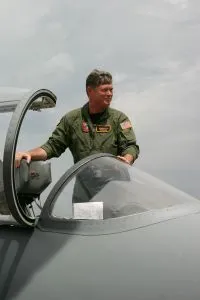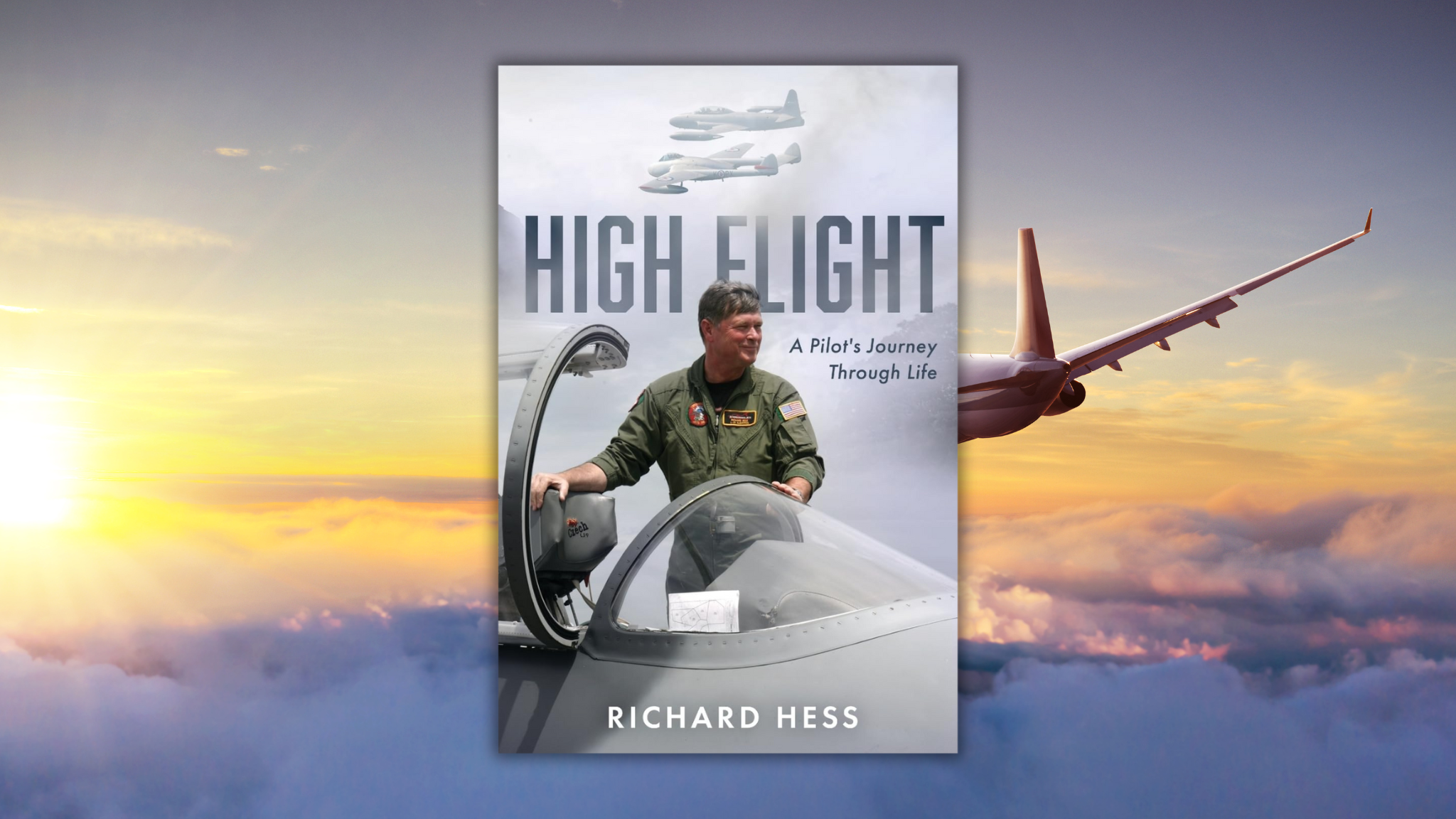From the roar of an F-15 slicing the sky at supersonic speed to the hushed stillness of a fog-covered runway, few lives have been lived at such altitude and with such depth as the one captured in High Flight
In this Q&A, author Richard Hess takes us beyond the cockpit to share not just the thrill of military and commercial aviation but also the personal struggles, family ties, and faith that shaped his journey.
What inspired you to write High Flight at this point in your life, and how did the process affect the way you view your past?
It took me more than 15 years to finish High Flight. I set it down for more than ten years when I went into business for myself. I just didn’t have the time. I felt compelled to write about my life since I not only had very exciting military and airline careers traveling the world, but I wanted to express my faith and my appreciation for the people in my life: family and friends. Life is a progression, and hopefully, you learn from your experiences, good and bad, and take those lessons forward. Most of all, I wanted it to be worth reading.
Many pilot memoirs focus on the thrill of flying, but you share deep emotional struggles from childhood onward. What gave you the courage to be so candid about your upbringing and personal growth?
My mother’s mother, my Nana, was of French-Canadian stock. She was more than a grandmother. One of 13 children, she was, hands down, the best cook I have ever known. She was also a sweet and caring woman, but she was not shy. She would tell you what she was thinking, even if it wasn’t what you wanted to hear, but it was always the truth. I must have inherited that gene because I am the same way. However, more than genetics, I believe writing High Flight was in its own way very therapeutic for me, a way to ‘process’ many of the negatives and positives from my life and put them in their place. I am a practicing Catholic, and they say confession is good for the soul, right?
From the T-37 to the C-141 Starlifter and the F-15, your memoir is a love letter to aircraft. Is there a particular plane that still holds a special place in your heart, and why?
That’s a hard question to answer, but it’s true, my mistresses are all cloaked in aluminum. Before I became a pilot, I tried different jobs. None of them appealed to me, and I never gave my best effort to those positions. Flying changed that. I enlisted in the Air Force, then applied for a scholarship. I did well on the aptitude test’s pilot section, so they gave me a pilot slot. Truthfully, I love them all. Imagine being 3 miles straight up on takeoff in an F-15 and looking back between the vertical tails at the end of the runway. Or the rush of pulling your A-10 up and rolling 90 degrees to see your bombs hit smack in the middle of the target! Or threading a 777 down to the runway on autopilot for landin,g and the only thing you see in the thick fog are a few tire skid marks on the runway. Every aircraft brought its own challenges and rewards. It’s why I still fly after 50 years.
Were there mentors who significantly influenced your approach to aviation or life, and have you passed those lessons on to younger pilots?
Two Air Force pilots stick out in my mind after 40-plus years. I flew an instrument practice sortie with a fellow T-37 instructor who had been a KC-135 tanker pilot previously. It was a clear day, yet he flew an instrument approach so precisely with the needles glued in the proper position. I was inspired by such precision that I’ve tried to mimic it for the rest of my career. I also flew a 4-ship combat air patrol (CAP) training sortie one night in the F-15 with a crusty Major who obviously was the most experienced fighter pilot in the flight. I was reminded of the old EF Hutton commercial: When EF Hutton speaks, people listen. He briefed our maneuvers, which included two aircraft guarding a simulated geographic area while the other two tried to attack it and not be detected. Imagine four aircraft rushing at each other at 20 miles per minute, over water, at night, and doing a supersonic split-S onto the tail of the second attacker. The knowledge and precise execution impressed me and again, I’ve tried to emulate that precision for the rest of my flying career. Finally, yes, I have mentored many young pilots in both the military and commercial worlds. All have gone on to fly as captains or even to face combat. Two of my students faced life-threatening emergencies and credited my training with helping to save their lives. I am tremendously proud of each of them. It’s another reason why I’m still in a cockpit.
Faith and philosophy run quietly but steadily through your story. How did your spiritual beliefs evolve through your military career and global travels?
I served in nine war zones and relief efforts. I’ve traveled to every continent. I’ve seen war and its aftermath. I raised three children and always worried about teaching them enough about the real world so that they would be ready to face life without me in case I didn’t come home from a dangerous mission. As I left on my first Desert Storm missions, I wondered if I was witnessing the Bible come true, so I read everything I could find about Revelations and end times. My faith grew as I accepted that Jesus died for me. I had been reborn, and I’ve made a greater effort to incorporate my faith into my daily life than I had before.
With a career this full, is there any story or experience you wish you had more space to explore? And do you see yourself writing another book — maybe focusing on one chapter of your life in more depth?
Writing another memoir is possible. Having grandchildren and recognizing how precious life is has changed me. Also, being much closer to the end of your life than its beginning gives you a different perspective. Your priorities change and you stop caring about many things that just don’t seem so important anymore. We seem to live in a chaotic world. There are so many conflicts and so many political divides. I would like to explore how this phase of my life has forced me to focus on a different set of priorities. I think these thoughts would be worth sharing.
About Richard Hess:
 Richard Hess has spent nearly 50 years traveling the globe as a professional pilot. He published his first novel, Night of the Bear, and has written dozens of aviation magazine articles about warbird flying, aircraft maintenance, safety, and international deliveries. Growing up in a troubled home, he overcame his childhood circumstances to achieve prominence in the aviation world. Raising a family and surviving multiple war zone deployments has taught him many of life’s shareable lessons.
Richard Hess has spent nearly 50 years traveling the globe as a professional pilot. He published his first novel, Night of the Bear, and has written dozens of aviation magazine articles about warbird flying, aircraft maintenance, safety, and international deliveries. Growing up in a troubled home, he overcame his childhood circumstances to achieve prominence in the aviation world. Raising a family and surviving multiple war zone deployments has taught him many of life’s shareable lessons.

